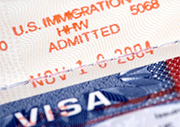Battered spouse
The United States of America welcome everyone who is searching for a better life. Unfortunately, there are situations when a person eligible for a Green card or citizenship is not able to get it because of cases of abuse or domestic violence.
Under the amendments by the Violence Against Women Act (VAWA) you may file your petition as a battered spouse, child or parent. The VAWA helps spouses, children, and parents of US citizens and permanent residents apply for a visa or status adjustment without the abuser’s knowledge. This allows victims of domestic violence seek safety and independence from their abuser. Although the self-petitioning provisions are part of the Violence Against Women Act they apply equally to men and women.
Who is eligible to apply
You may file for yourself if: you are currently married to or were a spouse of a US citizen or permanent resident; you have been abused or suffered extreme cruelty by your spouse; you resided with your spouse; you are a person of good moral character.
You do not need to stay married to your abusive spouse after you file the visa petition. Divorce will not affect USCIS decision. In certain circumstances you may apply even if you are not currently married.
You are eligible to apply as an abused child if: you are under 21 years of age; you are not married; you have suffered battery or extreme cruelty by your US citizen or permanent resident parent; you resided with your parent; you are a person of good moral character.
Note that a child under 14 is presumed to be a person of good moral character.
Also you may file a visa petition if you are the parent of a US citizen or permanent resident who is at least 21 years old; you have suffered abuse by your son or daughter; you resided with your child; you are a person of good moral character.
How to apply
You may apply for a visa yourself as a battered spouse, child or parent. It is very important that the application process happens without your abuser knowing about it. Application process requires you to complete the Form I-360 and collect supporting documentation and file it with the Vermont Service Center. Then you will receive a notice valid for 150 days that you can present to government agencies providing some public benefits. If your petition is approved and you do not have legal immigration status you may be placed under deferred action.
Also, if your Form I-360 gets approved or if you are placed under deferred action you are eligible to apply to work in the United States. You might be also eligible for a Green card. Please, ask your immigration attorney about available options.
Remember:
Do not worry if you cannot collect all documents required for self-petitioning. USCIS will consider any evidence you can provide, e.g. sworn statements from your friend and family members, support letters from employers and colleges, church and community members, your child’s school records, any other applicable letters, cards, etc.
Do not leave your residence without your ID (if you do not have one, try to obtain it as soon as possible!), marriage or divorce certificate, medical records of any injuries resulting from abuse, police records or any other documentation that might support your case.
Have all documents in languages any other than English translated and certified.
Do not use your permanent residence address for requesting documents, records or any other communication with immigration services. It is better to use your immigration attorney’s address. This will ensure that your abuser does not know about your application.
Keep you documents in a safe place. Also keep copies of everything you file to the immigration services.
Contact our lawyers at the Office of Katerina Utekhina if you need any help or advice.






